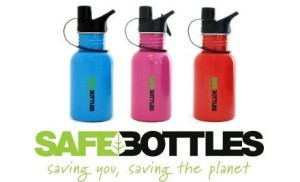Chemicals that interfere with the body’s regular hormonal messaging system are found to have their way in the food or drinks stored in reused plastic containers nowadays. Those water bottles which are found to be hanging in nearly everyone’s backpack nowadays are proved to be poisonous when reused, used for heating or freezing or left in the car for a few days. The bottles can contain trace amounts of a chemical known as Bisphenol A(BPA).

What is BPA?
BPA is the chemical substantially used for hardening or making the plastic bottle unbreakable for reuse and heating purposes. It is used to provide strength to plastic to stand against the fluid pressure on its walls thus making it robust.
Ill effects of BPA:

According to the Environment California Research & Policy Centre, which reviewed 130 studies on the topic, BPA has been linked to breast and uterine cancer, an increased risk of miscarriage, and decreased testosterone levels. It has been brought into the scientific arena as a chemical interfering with the natural hormonal messaging system of the body. BPA can also wreak havoc on children’s developing systems. Parents should mind the baby bottles and sippers made of plastic containing BPA. Though BPA doesn’t affect immediately and vigorously, but the cumulative effect may lead to some of the very devastating diseases and grave health issues.
Poisoning effect of reusing plastic bottles: CARCINOGENIC!

The plastic called polyethylene terephthalate commonly known as PET used in reusable bottles proves to be the home of a potential carcinogen called diethylhydroxylamine or DEHA. Not only are dioxins released if the plastic is heated or cooled, but plastic provides a good breeding ground for bacteria, it can kill you. Thus the bottles prove to be safe only when used once and for subsequent uses, we need to compromise with gulping up the carcinogen DEHA. If you wish to keep them for longer, then you might extend for another week but using it for longer than this might be a task risking your life. With the approval of using the bottle for a few days, some more warnings head up.
• Do not heat the bottles: heating is supposed to release or leach the chemicals into the food or drinks we take. The concern is that bacteria can thrive in warm, moist environments, and once opened, bacteria can grow in virtually any beverage container under the right conditions.
• Clean the mess in your car! Never leave plastic bottles in your car.
• Do not freeze drinks in these plastic bottles.
• Think before you microwave food in these plastic containers: Don’t microwave food in plastic containers. High temperatures cause more chemicals to leak into your food than storing it in the cool fridge
• Do not repeatedly wash or rinse these bottles: The same studies found that repeated re-use of such bottles—which get dinged up through normal wear and tear and while being washed—increases the chance that chemicals will leak out of the tiny cracks and crevices that develop over time
You can tell by looking underneath the bottle at the little triangle if it has #1 in it, that means you should only use it once and dispose! If it has like #2 or #3, that means you can use it over and over again.

Bacterial aspect of reusing bottles
Reusing bottles may lead to the bacterial transfer because of multiple uses and uses. Mouth contact can lead to easily develop bacteria on the bottle openings and thus the drinking water gets to breed bacteria successfully. Contamination will thus cause bacterial and fungal growth in the water while kept for storage. Thus cleaning the bottle before use might prove to be a bit helpful in dropping the risk
Reuse or simply litter?
Since we are guided not to reuse plastic bottles, PET in particular, so the last option left with us is to throw these bottles as trash and increase the landfill with these plastic bottles. The non-profit Berkeley Ecology Centre found that the manufacture of plastic #1 uses large amounts of energy and resources and generates toxic emissions and pollutants that contribute to global warming. Although we have heard of the 3R principle which basically aims at recycling and reusing, one is in a confused state of whether to look after the environment or one’s own health.
Safe Reusable Bottles Do Exist
Safer choices include bottles crafted from safer high density polyethylene HDPE (plastic #2), low-density polyethylene (LDPE, also known as plastic #4) or polypropylene (PP, or plastic #5). Aluminium bottles, such as those made by SIGG and sold in many natural food and natural product markets, and stainless steel water bottles are also safe choices and can be reused repeatedly and eventually recycled. The SIGG Company has been making metal water bottles with a soft, chemical-safe plastic lining for many years.

Thus it is better to invest in water bottles, safer ones, metal/glass ones and protective ones. It is for the water we drink to stay alive, the CLEAN water that we should drink to not just stay alive but stay healthy. Thus replace your bottles today, or clean the recent ones thoroughly.

Leave a Reply